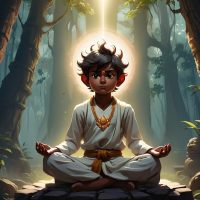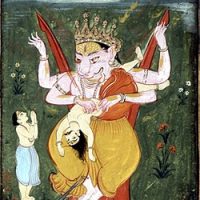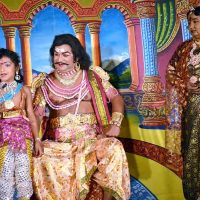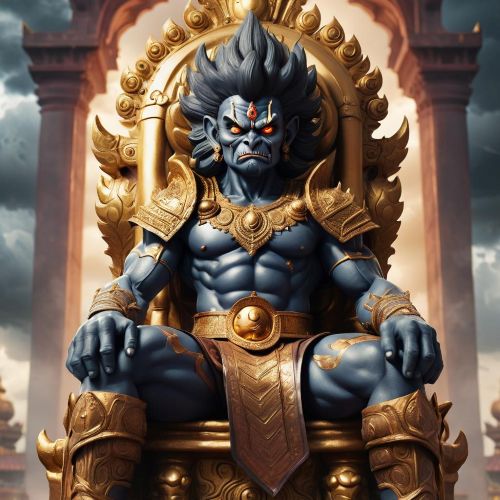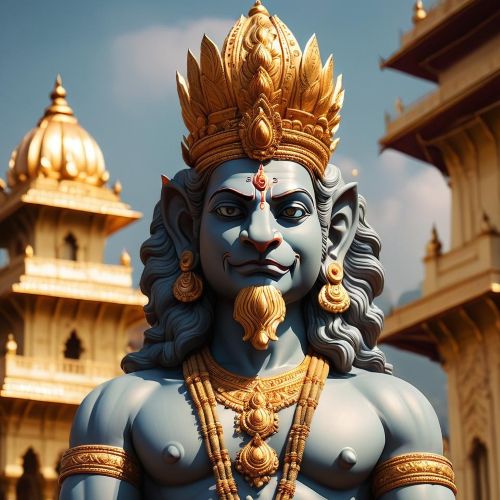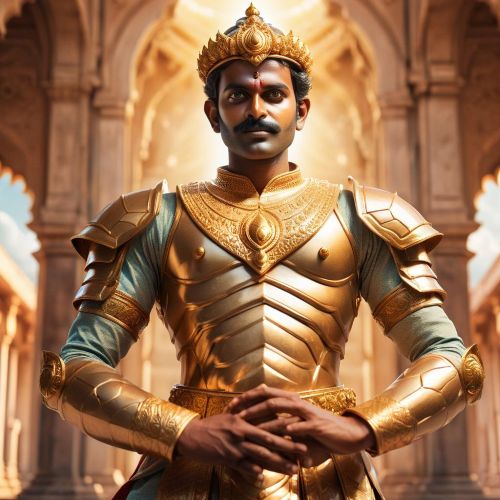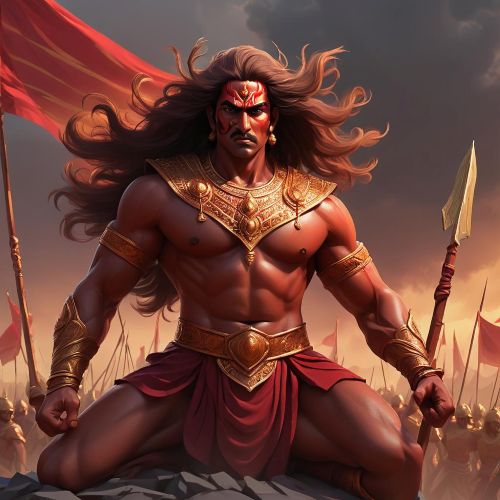Prahlada : The Defiant Devotee
Listen
At a glance
| Description | |
|---|---|
| Origin | Indian Mythology |
| Classification | Mortals |
| Family Members | Hiranyakashipu (Father), Kayadhu (Mother), Virochana (Son), Mahabali (Grandson) |
| Region | India |
| Associated With | Devotion, Worship |
Prahlada
Introduction
Prahlada is one of the most revered figures in Hindu mythology, remembered for his steadfast devotion to Lord Vishnu despite being born into a family of Asuras. His story, told in sacred texts like the Bhagavata Purana and Vishnu Purana, represents the triumph of faith over tyranny and righteousness over arrogance. Born to the demon king Hiranyakashipu and Queen Kayadhu, Prahlada’s unshakable belief in Vishnu set him apart from his father’s path of ego and power. His faith ultimately brought about the divine appearance of Narasimha, the half-lion incarnation of Vishnu, who destroyed Hiranyakashipu and restored order to the universe. Prahlada’s journey is celebrated as a timeless example of devotion, courage, and divine grace.
Physical Traits
Scriptures focus more on Prahlada’s spiritual qualities than on his physical appearance. He is usually depicted as a young boy with serene features and a calm, radiant expression that reflects his inner purity. Artists portray him wearing simple clothing, seated in meditation or prayer, surrounded by a divine glow that symbolizes his closeness to Vishnu. His gentle face and peaceful posture contrast strongly with the fierce and proud figure of his father, Hiranyakashipu. Prahlada’s appearance embodies innocence and devotion, emphasizing that true strength lies not in physical power but in faith and righteousness. His image continues to inspire believers, reminding them that even the purest soul can shine in the darkest surroundings.
Family
Prahlada was born into the Asura lineage as the son of Hiranyakashipu and Kayadhu. His father, empowered by a boon from Lord Brahma, believed himself invincible and demanded that everyone worship him instead of the gods. His mother, Kayadhu, was virtuous and compassionate, and while carrying Prahlada in her womb, she learned about devotion to Vishnu from the sage Narada. These teachings deeply influenced the unborn Prahlada, shaping his spiritual nature before birth.
Prahlada had several siblings, including Samhlada, Anuhlada, Shibi, and Bashkala, though none shared his devotion to Vishnu. His wife was Dhriti, and his son Virochana later became the father of the righteous king Mahabali, known for his generosity. The story also includes Holika, Prahlada’s aunt, who possessed a magical immunity to fire. She tried to kill Prahlada by taking him into the flames, but her power failed because of his faith, leading to her death. This event is now remembered through the festival of Holi, which celebrates the victory of devotion over evil.
Other Names
Prahlada is known by several names and titles that reflect his devotion and wisdom. He is often called Bhakta Prahlada, meaning Devotee Prahlada, a title that highlights his spiritual dedication. In many scriptures and traditions, he is also referred to as Prahlada Maharaja, showing reverence for his role as both a saintly devotee and a wise ruler. Within the Vaishnava tradition, he is honored as one of the twelve Mahajanas, great devotees who embody the principles of dharma and bhakti. In Sanskrit literature, his name appears as Prahlāda, and regional adaptations, especially in South India, preserve his story through names like Bhakta Prahlada in dance, drama, and folklore. These various names all emphasize the same core truth: Prahlada’s life is a symbol of divine devotion that transcends time and culture.
Powers and Abilities
Prahlada’s greatest strength came not from weapons or physical might but from his spiritual conviction. His unwavering faith in Lord Vishnu gave him protection against every attempt on his life. His father’s cruelty knew no bounds, as he tried to kill Prahlada with poison, wild beasts, fire, and even by throwing him from heights. Yet, each time, Prahlada survived unharmed through the grace of Vishnu. His ability to remain calm and fearless in the face of death showed that his faith was stronger than any worldly power.
Beyond divine protection, Prahlada also possessed deep spiritual wisdom. He is said to have learned the principles of bhakti yoga and divine truth from the sage Narada while still in his mother’s womb. Even as a child, he shared his understanding of devotion and morality with others, teaching that one must surrender to God with love and humility. His words in the Bhagavata Purana remain powerful teachings about selflessness, compassion, and the eternal nature of the soul. After the fall of Hiranyakashipu, Prahlada ruled his people with justice and humility, proving that true leadership comes from inner strength and moral clarity.
Modern Day Influences
Prahlada’s story continues to inspire millions today and remains an essential part of Hindu faith and culture. His unwavering devotion is celebrated every year during the festival of Holi, where the ritual of Holika Dahan recalls his miraculous survival from the fire. This festival represents the triumph of faith, purity, and truth over arrogance and deceit.
In art and literature, Prahlada’s tale has been retold through countless poems, paintings, plays, and modern adaptations. The classical dance-drama Prahlada Nataka from Odisha presents his story in devotional performance, blending music, dance, and spiritual lessons. Films and stage productions in regional languages, especially Telugu and Kannada, have kept his story alive for modern audiences.
Prahlada’s teachings continue to hold relevance in contemporary spiritual discussions. Religious leaders often cite his example to illustrate how faith can guide one through adversity and how devotion leads to peace and liberation. His story is also used in moral education for children, teaching the importance of honesty, courage, and compassion. In the broader context, Prahlada represents the victory of inner light over ignorance and the power of truth against oppression.
His influence extends beyond religion, inspiring writers, philosophers, and reformers who value moral strength and divine faith. Figures such as Mahatma Gandhi admired Prahlada’s unwavering adherence to truth and his peaceful defiance against tyranny. His legacy remains alive in Indian temples, cultural performances, and spiritual discourses, where he is remembered as the eternal devotee who proved that love for God can overcome any darkness.
Related Images
Source
Wikipedia contributors. (2002, October 5). Prahlada. Wikipedia. https://en.wikipedia.org/wiki/Prahlada
DharmaWiki. (2020, March 11). Prahlada (प्रह्लादः). https://dharmawiki.org/index.php/Prahlada_(%E0%A4%AA%E0%A5%8D%E0%A4%B0%E0%A4%B9%E0%A5%8D%E0%A4%B2%E0%A4%BE%E0%A4%A6%E0%A4%83)
SagarWorld Blog. (n.d.). Prahlad – Great Devotee Of Lord Vishnu. https://blog.sagarworld.com/itihaas/prahlad-great-devotee-of-lord-vishnu/
Hare Krishna. (n.d.). Prahlada Maharaja, the Personification of Remembering. https://www.harekrsna.com/practice/process/smaranam/prahlada.htm
AmitRay.com. (2024, December 16). From the Womb to Wisdom: Narada’s Teachings to Prahlada. https://amitray.com/naradas-teachings-to-prahlada/
Shyamasundara Dasa. (2016, December 31). How Prahlada Became a Devotee of Nrsimhadeva. https://shyamasundaradasa.com/jyotish/resources/articles/non-jyotish_articles/prahlada.html
Jagat Guru Rampal Ji. (2024, June 8). Prahlada & Hiranyakashipu: The Secret Facts You Must Know. https://www.jagatgururampalji.org/en/great-devotees/bhakta-prahlada/
Encyclopaedia Britannica. (2025, September 18). Prahlada | Hindu mythology. https://www.britannica.com/biography/Prahlada
Tagore, R. (1915). Bhakti and Devotion in Indian Mythology. Calcutta University Press.
Bhaktivedanta Swami Prabhupada, A. C. (1972). Srimad Bhagavatam: Canto 7 – The Science of God. Bhaktivedanta Book Trust.
Doniger, W. (2009). The Hindus: An Alternative History. Penguin Books.
Bryant, E. F. (2007). Krishna: A Sourcebook. Oxford University Press.
Vettam, M. (1995). Puranic Encyclopaedia. Motilal Banarsidass.
Frequently Asked Questions
What is lorem Ipsum?
I am text block. Click edit button to change this text. Lorem ipsum dolor sit amet, consectetur adipiscing elit. Ut elit tellus, luctus nec ullamcorper mattis, pulvinar dapibus leo.
What is lorem Ipsum?
I am text block. Click edit button to change this text. Lorem ipsum dolor sit amet, consectetur adipiscing elit. Ut elit tellus, luctus nec ullamcorper mattis, pulvinar dapibus leo.
What is lorem Ipsum?
I am text block. Click edit button to change this text. Lorem ipsum dolor sit amet, consectetur adipiscing elit. Ut elit tellus, luctus nec ullamcorper mattis, pulvinar dapibus leo.
What is lorem Ipsum?
I am text block. Click edit button to change this text. Lorem ipsum dolor sit amet, consectetur adipiscing elit. Ut elit tellus, luctus nec ullamcorper mattis, pulvinar dapibus leo.
What is lorem Ipsum?
I am text block. Click edit button to change this text. Lorem ipsum dolor sit amet, consectetur adipiscing elit. Ut elit tellus, luctus nec ullamcorper mattis, pulvinar dapibus leo.


